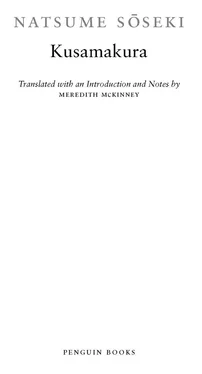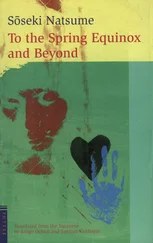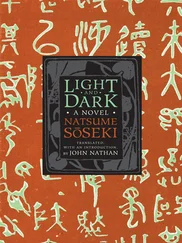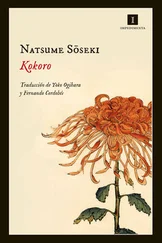Natsume Soseki - Kusamakura
Здесь есть возможность читать онлайн «Natsume Soseki - Kusamakura» весь текст электронной книги совершенно бесплатно (целиком полную версию без сокращений). В некоторых случаях можно слушать аудио, скачать через торрент в формате fb2 и присутствует краткое содержание. Жанр: Старинная литература, на английском языке. Описание произведения, (предисловие) а так же отзывы посетителей доступны на портале библиотеки ЛибКат.
- Название:Kusamakura
- Автор:
- Жанр:
- Год:неизвестен
- ISBN:нет данных
- Рейтинг книги:4 / 5. Голосов: 1
-
Избранное:Добавить в избранное
- Отзывы:
-
Ваша оценка:
- 80
- 1
- 2
- 3
- 4
- 5
Kusamakura: краткое содержание, описание и аннотация
Предлагаем к чтению аннотацию, описание, краткое содержание или предисловие (зависит от того, что написал сам автор книги «Kusamakura»). Если вы не нашли необходимую информацию о книге — напишите в комментариях, мы постараемся отыскать её.
Kusamakura — читать онлайн бесплатно полную книгу (весь текст) целиком
Ниже представлен текст книги, разбитый по страницам. Система сохранения места последней прочитанной страницы, позволяет с удобством читать онлайн бесплатно книгу «Kusamakura», без необходимости каждый раз заново искать на чём Вы остановились. Поставьте закладку, и сможете в любой момент перейти на страницу, на которой закончили чтение.
Интервал:
Закладка:
I’m a human and belong to the world of humans, of course, so for me the unhuman can last only so long, no matter how much I may enjoy it.
Yuanming too would not have spent the whole year simply gazing at the southern hil s, and I imagine Wang Wei was not a man to sleep happily without a mosquito net in that bamboo grove of his. If he had chrysanthemums to spare, Yuanming would have sold the lot to the local flower shop, and Wang Wei would have done a deal with his greengrocer over the bamboo shoots. And I am no different. No matter how I love the skylark and the mustard blossom, my desire for the unhuman doesn’t extend to bedding down in the mountains for the night. Even up here, after al , one meets with other humans. You wil come across a fel ow with his kimono skirts tucked up at the back and a cloth draped over his head, or a girl in a red wraparound, and even an occasional long-faced horse. You may breathe in the rarefied air of this high altitude, deep among the miles of encircling cypress trees, yet it stil holds the smel of man. Indeed, the place where I am headed tonight in search of peace across these mountains is the al -too-human realm of the hot spring inn at the vil age of Nakoi.
Nevertheless, how a thing looks depends on how you see it. “Listen to the bel ,†Leonardo da Vinci told his pupils. “It is a single sound, but you al hear it variously.†A man or a woman too wil appear very different depending on your point of view. Since I’ve come here to devote myself to the unhuman, this is the perspective on humans that I wil take, and it is bound to be different from the view I would have from the midst of a life lived deep in the cramped little streets of the crowded world. Very wel , granted that I can’t altogether escape the realm of human feelings; at least I can probably maintain the light detachment experienced by the viewer of some classic Noh drama. The Noh drama, after al , has its human feelings. There is no guarantee you won’t weep at a play like Shichikiochi or Sumidagawa. 5 But what we experience in these plays is the effect of three parts human feeling to seven parts art. The pleasure we gain from a Noh play springs not from any skil at presenting the raw human feelings of the everyday world but from clothing feeling “as it is†in layer upon layer of art, and in a kind of slowed serenity of deportment not to be found in the real world.
How would it be if I chose to view as actions in a Noh drama the events and people I meet with in the course of this journey? Of course I can’t altogether do away with human feeling, but since this journey is essential y poetic in intent, it would be good to use the “unhuman†I seek to good effect and row its little boat as far upstream as possible. The southern hil s and bamboo groves of those ancient poems are of a different nature, of course; nor can I treat humans quite as I do the skylark and mustard blossom; but my ideal is to approach that state as far as possible and do al I can to view humans from its vantage point. The poet Basho after al , found elegance even in the horse peeing by his pil ow, and he composed a haiku about it.6 Let me emulate him, then, and deal with the people I meet on this journey—farmer, townsman, vil age clerk, old man, or old woman—on the assumption that each is a smal component figure in a landscape scrol painting. Unlike figures in a painting, of course, they wil al be conducting their lives with a wil ful independence, but to treat them as a normal novelist would—to pursue the reasons behind their individual actions, delve into their psychological workings, and go into al the ins and outs of their human entanglements—would be merely vulgar.
Of course they may move about. One can view the figures in a painting as moving forms, after al . But however much they move, those figures remain confined to the flat surface. Once you conceive of them as leaping out of the painting, you’l find them bumping up against you, and you’l become ensnared in the troublesome business of self-interested interactions with them. And the more troublesome they become, the less able you are to view them aesthetical y. No, I shal aim to observe the people I meet from a lofty and transcendent perspective, and do my best to prevent any spark of human feeling from springing up between us. Thus, however animatedly they may move hither and yon, they won’t find it easy to make the leap across to my heart; I wil stand watching as before a picture, as they rush about inside it waving their arms. I can gaze with a calm and unflinching eye from the safe distance of three feet back. To express it another way: being free of self-interested motives, I wil be able to devote al my energy to observing their actions from the point of view of Art. With no other thought in mind, I wil be in a fine position to pass lofty judgment on the presence or absence of beauty in al I view. . . .
Just as I reach this conclusion, the sky grows suddenly ominous. The seething cloud that a little earlier began to loom overhead has quickly fractured and spread til al around me seems nothing but a sea of cloud, and now a gentle spring rain begins to fal . I have long since left the mustard blossom fields behind and am now high among mountains, but how close they are I cannot tel , owing to the veil of fine, almost mistlike rain. When a gust of wind from time to time parts the high clouds, I catch glimpses of the blackish shape of a high ridge off to my right. It seems that just across the val ey from me runs a mountain range. Immediately to my right is the foot of another mountain. An occasional pine or some such tree appears suddenly from deep within the dense misty rain; no sooner is it there than it is gone again. Weirdly, I find myself unable to distinguish whether the rain is shifting, or the tree, or my own dreamy vision.
The path has grown surprisingly broad and flat, and I have no difficulty in walking now, but my lack of rain gear makes me hurry on my way. The rain is dripping from my hat when I hear, about ten yards ahead, the tinkle of a little bel , and out of the rainy darkness emerges a packhorse driver.
“Would there be anywhere to rest around here?†I ask.
“There’s a teahouse a mile on. You’re pretty wet, aren’t you?â€
Stil a mile to go, I think, as the driver’s figure envelops itself in rain like some shadowy magic lantern form and becomes lost to sight once more.
I watch as the fine-grained rain gradual y thickens to long continuous threads, each twisted by the wind. My haori has long since become saturated,7 and the water has now penetrated my underwear, where it grows tepid from the heat of my body. It’s an unpleasant sensation, and I tilt my hat low and step briskly out.
If I picture myself, a sodden figure moving in this vast ink-wash world of cloud and rain shot through diagonal y with a thousand silver arrows, not as myself but as some other person, there’s poetry in this moment. When I relinquish al thought of the self as is and cultivate the gaze of pure objectivity, then for the first time, as a figure in a painting, I attain a beautiful harmony with the natural phenomena around me. The instant I revert to thoughts of my distress at the fal ing rain and the weariness of my legs, I lose my place in the world of the poem or painting. I am as before, a mere cal ow townsman. The swirling brushstrokes of cloud and mist are a closed book to me; no poetic sentiment of fal ing blossom or cal ing bird stirs my breast; I have no way of understanding the beauty of my own self as it moves lonely as cloud and rain among the spring mountains. . . .
To begin with, I tilt my hat and stride out. Later, I simply walk with eyes fixed on my feet. In the end, I am plodding unsteadily along, with shoulders hunched. The branches fil ing my vision sway in the blowing rain, which drives in relentlessly from every direction upon the solitary traveler. This is a bit too much of the unhuman for my taste!
Читать дальшеИнтервал:
Закладка:
Похожие книги на «Kusamakura»
Представляем Вашему вниманию похожие книги на «Kusamakura» списком для выбора. Мы отобрали схожую по названию и смыслу литературу в надежде предоставить читателям больше вариантов отыскать новые, интересные, ещё непрочитанные произведения.
Обсуждение, отзывы о книге «Kusamakura» и просто собственные мнения читателей. Оставьте ваши комментарии, напишите, что Вы думаете о произведении, его смысле или главных героях. Укажите что конкретно понравилось, а что нет, и почему Вы так считаете.












